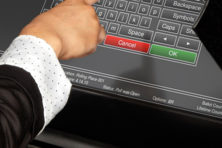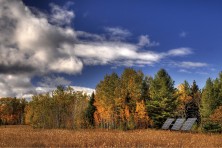Door County Election News: Keeping the Count
- Share
- Tweet
- Pin
- Share
The job is by no means glamorous, and is certainly under-appreciated, but it’s vital to American elections. The poll workers who secure the vote in Door County have seen a lot through the years, but none more than Gail Zahn, who has passed out more ballots than anyone else in the county to date.
At 72, Zahn has worked nearly every election since the late 1960s, making her a four-decade public servant of sorts.
Growing up in the cherry orchards of Door County in the town of Sevastopol, Zahn became resilient to long, monotonous hours of performing the same task, which suits her well during long election days.
“I picked cherries, strawberries, even apples, which I didn’t like,” Zahn said. “Then I went to business college and ran everything in school. I did that because my father told me I could, that I was smart enough to.”
After business college, Zahn returned to orchard life with her husband Roger, who she met when she was in third grade and he was in fourth. They started their family of four children — one has been Door County treasurer for 18 years, another teaches at Sevastopol School — all of whom worked in the orchards from the time they could walk.
Her first foray into poll working was as an alternate, one of the stepping-stones before being appointed to full-time poll worker. In the 1960s, workers were appointed by a precinct committee that worked to keep the numbers of Democrat and Republican poll workers balanced.
As a staunch Republican, Zahn said it wasn’t until she started working the polls that she gave much thought to there being two (main) political parties and that it took a comment from her church pastor when she was in her teens for the two-party system to dawn on her.
“I remember it was the day that President Eisenhower was going to announce whether he was going to run for President again and I was at church. So I said to Pastor Jordan to hurry up the sermon so we could go and listen. He looked at me, and said ‘So?’ And I stopped and looked at him, inhaled and said ‘Pastor Jordan! Are you a Democrat?’ And he looked at me and said ‘Gail, not everyone is a Republican.’ And I was shocked.”
The town and village clerks still work to keep the number of poll workers from each party balanced, according to Linda Wait, the clerk for the town of Sevastopol.
“Whichever party has the majority of votes in the previous presidential or gubernatorial election, gets one more poll worker than the other party,” Wait explained.
Zahn was first appointed as an alternate by her brother Chet Ostram Jr., who was on the precinct committee at the time.
“The elections were and are in the spring and fall,” Zahn said, “and those are times I wasn’t busy in the orchards.”
There isn’t a ton of training for poll workers, Zahn said. When she first started, votes from each of the ballots were counted by hand – the poll workers were responsible for the first vote count. Then the county moved to the punch card – the now infamous chad system – and now the county uses a machine that counts the votes as the ballots are turned in.
Poll worker training has increased a bit in recent years, especially after the implementation of the federal Help America Vote Act of 2002, according to Wait.
“The poll workers have started checking drivers’ licenses and birthday information, and even though it’s a long day for them, the poll workers are encouraged to be polite and pleasant to the people who come and vote,” Wait said.
“In order to become a poll worker, registered voters can contact their political party and then their municipal clerk, and we’ll put their names on the list of potential poll workers,” Wait said.
The money Zahn and others make for working at the polls during the spring and fall elections isn’t much, Zahn said, and isn’t a factor in her choice to continue working the polls.
“I don’t think I made minimum wage when I started in the 1960s,” Zahn said. “Now, it’s $12 per hour and I work the whole day, 7 am to at least 8 pm.
“I’ve always worked all day,” she continued. “It’s just now that they’ve started to work in shifts.”
The most significant and disconcerting change for Zahn now is the shift from knowing every person who walked through the polling place doors to knowing fewer and fewer faces.
Even with the changing community, for Zahn, working the polls isn’t so much about serving her country, or the money she makes, as it is an opportunity to see folks from the area she hasn’t seen for awhile and to catch up on the latest news.
“I love it because I see everybody I didn’t get to see all summer when I was working,” Zahn said. “And I still love it for that reason.”


